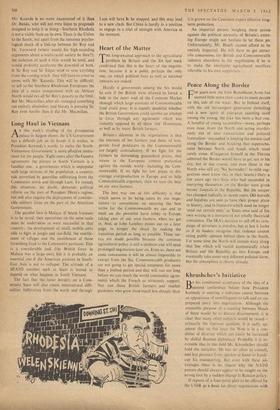Heart of the Matter
rr HE long-awaited approach to the agricultural I problem by Britain and the Six last week confirmed that this is the heart of the negotia- tion, because it is a point, perhaps the only one, on which political lives as well as national interests are staked.
Hardly a government among the Six would be safe if the British were allowed to knock a hole in the outer wall of the Common Market through which large amounts of Commonwealth food could pour. It is equally doubtful whether the British Government could survive an attempt to force through any agreement which was violently opposed by all three 'old' Dominions as well as by many British farmers.
Britain's dilemma in the negotiations is that the interests of her farmers and those of tem- perate food producers in the Commonwealth are largely contradictory. If we fight for the farmers by demanding guaranteed prices, that means in the European context protection against the outside world -including the Com- monwealth. If we fight for low prices to dis- courage overproduction in Europe and so help Commonwealth exporters, then we turn the heat on our own farmers.
The best way out of this difficulty is that which seems to be being taken by our nego- tiators—to concentrate on securing the best terms for the Commonwealth we can and to bank on the powerful farm lobby in Europe taking care of our own farmers when we get in. And, as John Lambert points out on a later page, to temper the shock by making the transition period as long as possible. These tac- tics arc made possible' because the common agricultural policy.is still a skeleton and will need prolonged negotiation later on. Even so. there are some concessions it will.be almost impossible to extract from the Six. Commonwealth producers are not going to get special treatment for more than a limited period and that will run out long before we can reach the world commodity agree- ments which the French so virtuously support. Nor can those British farmers and market gardeners who grow food much less cheaply than
it is grown on the Continent expect effective long- term protection.
An impartial person weighing these points against the political necessity of Britain's enter- ing Europe might not hesitate to let them go. Unfortunately, Mr. Heath cannot afford to be entirely impartial. He will have to get attrac- tive concessions. for British and Commonwealth industry elsewhere in the negotiations if he is to make the inevitable agricultural sacrifices tolerable to his own supporters.


































 Previous page
Previous page